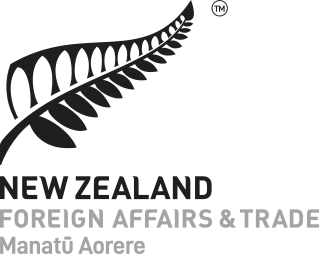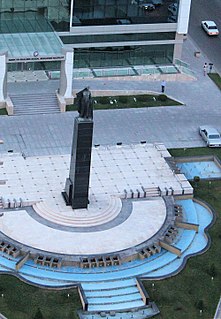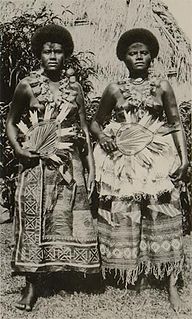
Fiji has experienced many coups recently, in 1987, 2000, and 2006. Fiji has been suspended various times from the Commonwealth of Nations, a grouping of mostly former British colonies. It was readmitted to the Commonwealth in December 2001, following the parliamentary election held to restore democracy in September that year, and has been suspended again because of the 2006 coup, but has been readmitted a second time after the 2014 election. Other Pacific Island governments have generally been sympathetic to Fiji's internal political problems and have declined to take public positions.

The foreign relations of New Zealand are oriented chiefly toward developed democratic nations and emerging Pacific Island economies. Until the late 20th century, New Zealand aligned itself strongly with the United Kingdom and had few bilateral relationships with other countries. From the latter half of the 20th century, Australia has been New Zealand's most important cultural, economic and military partner. Today, the country participates in several multilateral political organisations, including Asia-Pacific Economic Cooperation, the Pacific Community, and the Pacific Islands Forum. New Zealand has been described as an emerging power; however, such claims needs to be considered in the context of its medium-sized economy and limited military capability. The country's major political parties have generally agreed on the broad outlines of foreign policy, and the government has been active in promoting free trade, nuclear disarmament, and arms control.

Politics of Solomon Islands takes place within the framework of a parliamentary representative democratic, constitutional monarchy. Solomon Islands is an independent Commonwealth realm, where executive power is exercised by the government. Legislative power is vested in both the government and a multi-party parliament.

Solomon Islands is a sovereign country consisting of six major islands and over 900 smaller islands in Oceania, to the east of Papua New Guinea and northwest of Vanuatu. It has a land area of 28,400 square kilometres (11,000 sq mi), and a population of 652,858. Its capital, Honiara, is located on the largest island, Guadalcanal. The country takes its name from the Solomon Islands archipelago, which is a collection of Melanesian islands that also includes the North Solomon Islands, but excludes outlying islands, such as the Santa Cruz Islands and Rennell and Bellona.

The foreign policy of Solomon Islands as of 2008 was described by the Solomon Islands government as a "look north" policy, aimed as strengthening diplomatic and economic relations with Asian countries for development purposes.

The Ministry of Foreign Affairs and Trade (MFAT) is the public service department of New Zealand charged with advising the government on foreign and trade policy, and promoting New Zealand's interests in trade and international relations.

Naela Chohan is a Pakistani ambassador, artist and diplomat. As a seasoned and veteran diplomat, ambassador Chohan has assumed a leadership position in eight different Pakistani diplomatic missions on five different continents. Naela Chohan is a hyperpolyglot with demonstrable fluency in seven Indo-European languages including Persian, French, and Spanish.
Filipinos in South Korea have a history dating back to the establishment of South Korea. Many live in Seoul, where they gather in the Hyehwa-dong and Dongsung-dong areas of Jongno-gu.

Women in Azerbaijan nominally enjoy the same legal rights as men; however, societal discrimination remains a problem.
Tuvalu is a small island nation in the South Pacific, located North of Fiji and North West of Samoa. The population at the 2012 census was 10,837. Tuvalu has a written constitution which includes a statement of rights influenced by the United Nations Universal Declaration of Human Rights and the European Convention on Human Rights. While most human rights in Tuvalu are respected, areas of concern include women’s rights and freedom of belief, as well as diminishing access to human rights in the face of global warming. The latter has played a major role in the implementation of human rights actions in Tuvalu given its geographical vulnerability and scarce resources.

Women in Tuvalu continue to maintain a traditional Polynesian culture within a predominantly Christian society. Tuvaluan cultural identity is sustained through an individual's connection to their home island. In the traditional community system in Tuvalu, each family has its own task, or salanga, to perform for the community. The skills of a family are passed on from parents to children. The women of Tuvalu participate in the traditional music of Tuvalu and in the creation of the art of Tuvalu including using cowrie and other shells in traditional handicrafts. There are opportunities of further education and paid employment with non-government organisations (NGOs) and government enterprises, education and health agencies being the primary opportunities for Tuvaluan women.

Women in Fiji live in or are from the Republic of Fiji. On March 8, 2007, The Fiji Times ONLINE described Fijian women as playing an important role in the fields of economic and social development in Fijian society. The women of the Republic of Fiji are the "driving force" in health service as nurses and medical doctors. They are also key players and managers in the tourism and entertainment industries, as well as teachers in the field of education.
Meri Toksave is a youth-led, non-profit, non-governmental organisation that designs and delivers programmes and partnerships for the promotion and protection of human rights, the empowerment of women and girls, the advancement of gender equality, and the prevention and elimination of domestic, sexual and gender-based violence in Papua New Guinea.

India–Solomon Islands relations refers to the international relations between India and Solomon Islands. Neither country has a resident ambassador. The High Commission of India in Port Moresby, Papua New Guinea is concurrently accredited to the Solomon Islands
Daisy Alik-Momotaro is a Marshallese politician. She was a member of the Legislature of the Marshall Islands from 2015 to 2019, representing the Jaluit constituency.

Joy Kiriau Kere is a diplomat from the Solomon Islands. In 2014 she was appointed the first Solomon Islands High Commissioner to New Zealand, becoming the country's first woman to head a foreign mission abroad.

Women's Rights Action Movement (WRAM) is a women's rights organisation based in the Solomon Islands, which campaigns for greater representation of women in politics, as well as advocating for changes to the governance of the country to enable gender parity.
Feminist foreign policy, or feminist diplomacy, is a concept that calls for a state to promote values and good practices to achieve gender equality, and to guarantee all women enjoy their human rights, through diplomatic relations. The practice was initiated by Margot Wallström, former Swedish Foreign Affairs Minister.
Pionie Boso is a women's rights activist from the Solomon Islands, who was awarded an International Women of Courage Award in 2011 for her work towards ending gender-based violence in the country.
Solomon Islands nationality law is regulated by the 1978 Constitution of Solomon Islands, as amended; the Citizenship Act 2018, and its revisions; and international agreements entered into by the government of the Solomon Islands. These laws determine who is, or is eligible to be, a national of the Solomon Islands. The legal means to acquire nationality, formal legal membership in a nation, differ from the domestic relationship of rights and obligations between a national and the nation, known as citizenship. Solomon Islander nationality is typically obtained either on the principle of jus soli, i.e. by birth in the Solomon Islands or under the rules of jus sanguinis, i.e. by birth abroad to parents with Solomon Islander nationality. It can be granted to persons who have lived in the country for a specific period of time, or who have an affiliation to the country through naturalisation.












